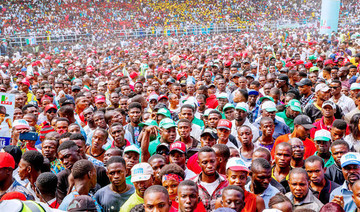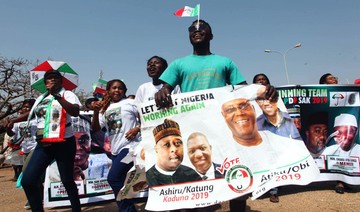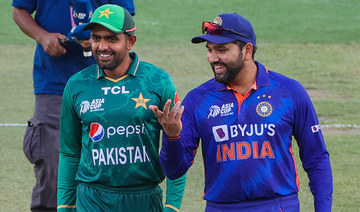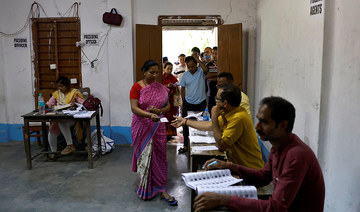KANO, Nigeria: Nigeria’s electoral commission delayed the presidential election until Feb. 23, making the announcement a mere five hours before polls were set to open Saturday. It cited unspecified “challenges” amid reports that voting materials had not been delivered to all parts of the country.
Residents of Africa’s most populous nation and largest democracy will soon wake up to outrage. Many had relocated for the chance to vote.
“This was a difficult decision to take but necessary for successful delivery of the elections and the consolidation of our democracy,” commission chairman Mahmood Yakubu told reporters in the capital, Abuja. He said more details would be released during an afternoon briefing.
A review of logistics, along with the determination to hold a credible vote, led the commission to conclude that going ahead with the election as planned was “no longer feasible,” he said.
Nigeria also postponed the previous presidential election in 2015 because of deadly insecurity in the northeast, which remains under threat from Islamic extremists.
As word filtered out after midnight of a possible election delay at least in some regions, the Situation Room, a civil society collective monitoring the vote, said in a statement that “any suggestion that the election be held in a staggered manner will be totally unacceptable, and would be a recipe for a disastrous election.”
More than 84 million voters in this country of some 190 million had been expected to head to the polls in what is seen as a close and heated race between 76-year-old President Muhammadu Buhari and top challenger Atiku Abubakar, a billionaire former vice president.
Both have pledged to work for a peaceful election even as their supporters, including high-level officials, have caused alarm with vivid warnings against foreign interference and allegations of rigging.
“This is truly disappointing but ... Nigeria will prevail,” the spokesman for Vice President Yemi Osinbajo said on Twitter, noting that Buhari was already in his hometown where he had been set to vote.
When Buhari came to power in 2015 he made history with the first defeat of an incumbent president in an election hailed as one of the most transparent and untroubled ever in Nigeria, which has seen deadly post-vote violence in the past.
Now Buhari could become the second incumbent to be unseated. His term has been marked by a crash in global oil prices that spun Nigeria’s heavily crude-dependent economy into a rare recession, from which it only emerged in 2017. Unemployment shot up. The country passed India as the nation with the most people living in extreme poverty. More than 13 million children are said to be out of school.
Insecurity on multiple fronts has seen little improvement, worrying neighbors of the West African regional powerhouse and beyond. While the military pushed Boko Haram extremists out of many communities in the country’s northeast, claims of the group being “crushed” have withered in the face of continuing violence. A new offshoot pledging allegiance to the Daesh group has surged in recent months, attacking military bases — and this week, a governor’s convoy — sending tens of thousands of people fleeing anew.
On top of that, banditry in the northwest, oil militants in the south and deadly fighting in the central region between farmers and herders over increasingly precious land keep security forces stretched and the population on edge. On Friday, authorities reported at least 66 deaths in a single community this week in what one resident blamed on farmer-herder clashes.
“We love our country and we need our country to be safe from all the violence ... and all the nonsense that takes place during election time,” worshipper Amin Muhammad Khalif said as he emerged Friday from prayers in Kano, Nigeria’s second-largest city in a nation largely evenly split between Muslims and Christians.
Even in the fight against corruption, in which Buhari could claim some progress, many in Nigeria have expressed concern that those targeted are mostly opposition figures..
Meanwhile, many Nigerians worry about Buhari himself after he spent more than 150 days outside the country for still-unspecified medical treatment. Spare in both charisma and physique, Buhari spoke for just a few minutes at his final campaign rally on Thursday and struggled to hear or grasp a number of questions in a recent televised town hall.
Borrowing a page from President Donald Trump’s playbook, top challenger Abubakar has campaigned on the theme of “Let’s Make Nigeria Work Again,” while vowing to apply his business acumen to privatize Nigeria’s all-important state oil company and lift 50 million people out of poverty by 2025.
Despite such proclamations, Abubakar has never managed to shake years of corruption allegations. And, as Buhari grumbled in his final pre-election address to the nation on Thursday, one “cannot simply proclaim jobs into existence.”
In the end, the now-delayed vote could come down to the sorry state of Africa’s largest economy and people’s empty pockets, and stomachs.
In Abuja, 56-year-old Bako Sharibu was wrist-deep in a dumpster as he fished out pieces of plastic for recycling. His shy smile disappeared as he recalled that he once had good work as a janitor. Now he struggles to make his target of 300 naira (83 cents) a day.
“Everybody suffers too much. Hungry everywhere,” he said, adding that if he could save a few thousand naira he would send the money to his three children in northern Kaduna state.
Then he shook his pocket. It was near sunset. He had just 50 naira in hand.
He will be voting for Abubakar, he said. Nigeria needs change.
Nigeria postpones presidential election for one week
Nigeria postpones presidential election for one week
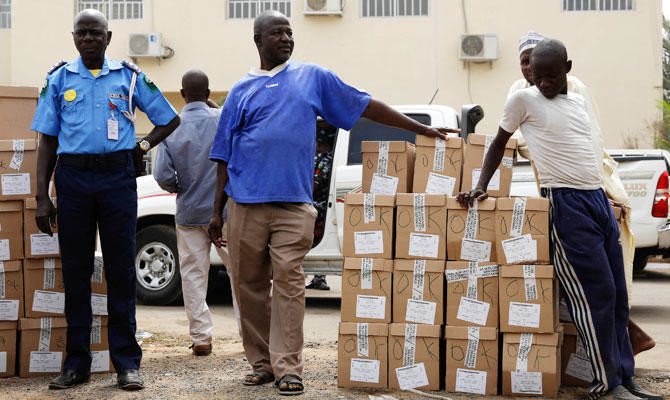
After Pakistan alert, WHO likely to issue wider warning on contaminated J&J cough syrup

- The UN health body said it puts out global medical product alerts to ‘encourage diligence’ by authorities
- The WHO this week sent out alert on five batches of contaminated cough syrup ingredients found in Pakistan
LONDON: The World Health Organization is likely to issue a wider warning about contaminated Johnson and Johnson-made children’s cough syrup found in Nigeria last week, it said in an email.
Nigeria’s regulator recalled a batch of Benylin paediatric syrup last Wednesday, having found a high level of diethylene glycol in the product during routine testing.
The contaminant, alongside another closely related toxin, ethylene glycol, has been linked to the deaths of more than 300 children in Cameroon, Gambia, Indonesia and Uzbekistan since 2022, though there is no evidence that these incidents are linked with the latest recalls.
The UN health body said it puts out global medical product alerts to “encourage diligence” by national authorities and was likely to do so in this instance, “subject to confirmation of certain details from parties.”
The recalled batch of Benylin syrup was made by J&J in South Africa in May 2021, although Kenvue now owns the brand after a spin-off from J&J last year.
J&J has referred requests for comment to Kenvue. In an emailed statement on Friday, Kenvue said it had carried out tests on the batch recalled by Nigeria and had not detected either diethylene or ethylene glycol.
“We continue to work closely with health authorities and the WHO and are engaging with NAFDAC to understand their test results, including verifying the authenticity of the sampled product, the testing methodology used, and results reported by the agency,” the statement added.
Since Nigeria’s recall, five other African countries have also pulled the product from shelves — Kenya, Rwanda, Tanzania, Zimbabwe and South Africa, where the drug was made.
South Africa’s regulator has also recalled another batch of the syrup, which is used to treat coughs, hay fever and other allergic reactions in children.
Diethylene glycol is toxic to humans when consumed and can result in acute kidney failure, although there have been no reports of harm in the latest incident.
RAW MATERIALS
In the 2022 cases, the contamination in the syrups came from the raw materials used by manufacturers in India and Indonesia.
The WHO said it was collaborating with both the manufacturer and regulatory authority in South Africa to investigate the Benylin paediatric syrup, and had information on the source of the ingredients used. Kenvue has previously said it tested its ingredients before manufacture.
The agency said the possibility that the syrup was counterfeit was also “under consideration as part of investigations.”
Earlier this week the WHO sent out a separate alert on five batches of contaminated cough syrup ingredients found in Pakistan that appeared to have been falsely labelled as Dow Chemical products.
It was the first alert the WHO has sent on excipients — elements of a medicine other than the active pharmaceutical ingredient — rather than finished products, the agency confirmed on Friday.
The batches of propylene glycol were contaminated with ethylene glycol.
“It was critical for WHO to also alert manufacturers that may have been procuring this material to exercise more caution,” a WHO spokesperson said by email.
Propylene glycol is not an ingredient in Benylin paediatric syrup, a Kenvue spokesperson said on Friday.
Polish flag carrier LOT cancels Friday flights to Tel Aviv and Beirut, PAP reports

- Decisions about future flights would be made on an ongoing basis
WARSAW: Polish national airline LOT canceled flights on Friday to Tel Aviv and Beirut due to the unstable situation in the region, a spokesperson was quoted as saying by state news agency PAP.
“Today’s flight 151/152 to Israel from Warsaw and to Beirut 143/144 have been canceled,” Krzysztof Moczulski told PAP. He said decisions about future flights would be made on an ongoing basis.
French police arrest man who threatened to blow himself up at Iran’s Paris consulate

- Police verifying man’s identity and trying to determine whether he had weapons
PARIS: A man who had threatened to blow himself up at Iran’s consulate in Paris was arrested by police, a police source said.
French police earlier cordoned off the Iranian consulate, Reuters reporters saw, and did not immediately confirm finding any weapons.
A police source told Reuters the man was seen at about 11 am (0900 GMT) entering the consulate, carrying what appeared to be a grenade and explosive vest.
A Paris police official told The Associated Press that officers were verifying the man’s identity and trying to determine whether he had weapons.
Police earlier said they were at the scene and asked the public to avoid the area but provided no further details.
Service was interrupted on a nearby metro line for security reasons, the RATP metro company said.
A police cordon remained in place on Friday afternoon, but traffic was resuming in the area.
A person at the Iranian embassy who responded to a call from Reuters declined to provide any information on the situation.
It was unclear whether the incident had any link to the escalating tensions between Iran and Israel.
Earlier on Friday, explosions echoed over the Iranian city of Isfahan in what sources described as an Israeli attack, but Tehran played down the incident and indicated it had no plans for retaliation — a response that appeared gauged toward averting region-wide war.
The incident also comes as Paris is gearing up to host the summer Olympics.
* With Reuters and AP
Blinken says US ‘not involved in any offensive operation’

- ‘All I can say is for our part and for all the members of the G7 our focus is on de-escalation’
CAPRI, Italy: US Secretary of State Antony Blinken on Friday refused to comment on reports of an attack by Israel on Iran, beyond saying Washington was “not involved in any offensive operation.”
Speaking to journalists after a meeting with G7 counterparts in Italy, he declined to answer repeated questions about explosions in Iran, and reports that Israel had carried out retaliatory strikes.
“I’m not going to speak to these reported events... All I can say is for our part and for all the members of the G7 our focus is on de-escalation,” Blinken told a press conference on the island of Capri.
“The US has not been involved in any offensive operation,” he said.
Speaking to reporters earlier, G7 host Antonio Tajani, the foreign minister of Italy, said Washington had been informed in advance of the strikes, without giving details.
“The United States were informed at the last moment,” he said, adding that “it was just information” passed on — without saying who by.
The reports dominated the G7 Friday, with Tajani forced to change the agenda, but little public information emerged.
In its final statement, the Group of Seven ministers said: “In light of reports of strikes on April 19th, we urge all parties to work to prevent further escalation. The G7 will continue to work to this end.”
Israel had warned it would hit back after Iran fired hundreds of missiles and drones at Israel almost a week ago, in retaliation for a deadly strike — which Tehran blamed on its foe — that levelled Iran’s consular annex at its embassy in Syria.
Indians head to the polls in world’s biggest election
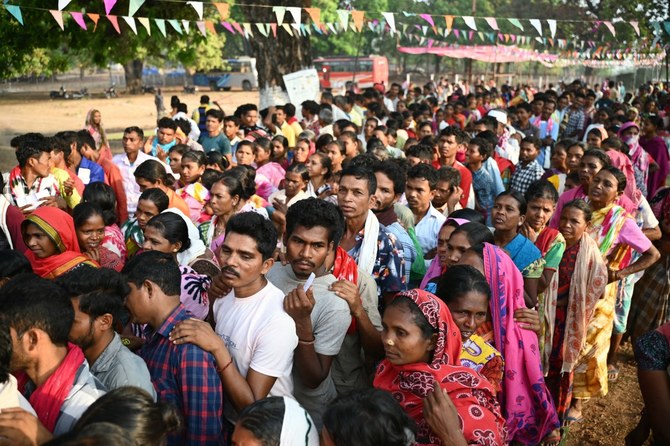
- Polling takes place in phases over the next six weeks, with results expected on June 4
- Over 968 million people are registered to vote, with 168.6 million casting ballots on Friday
NEW DELHI: Indian voters headed to the polls on Friday for the first phase of the world’s biggest general election, in which Prime Minister Narendra Modi is aiming for a rare third consecutive term.
More than 968 million people are registered to vote, with polling taking place over the next six weeks, as results are expected on June 4.
After April 19, the other voting dates will be April 26, May 7, May 13, May 20, May 25 and June 1, with some states completing the process on a single day, and others having it spread out in several phases.
Friday’s polling was held in 21 states and union territories, including the most populous ones such as Uttar Pradesh, Bihar, Rajasthan, Tamil Nadu, and Maharashtra, as well as smaller northeastern states and the northern Himalayan territory of Jammu and Kashmir.
In Kashmir, this is the first election since its special autonomous status and statehood were scrapped through the Indian government’s controversial constitutional amendment in 2019.
Chief Election Commissioner of India Rajiv Kumar told reporters on Friday that 168.6 million people were expected to cast their ballots on Friday.
“The preparations started, actually, two years back. Wide range of preparations … It’s a tremendous exercise,” he said.
MAIN CONTENDERS
More than 2,600 political parties are registered in the marathon election and 543 contested seats in the lower house of Parliament. The party or coalition that wins at least 272 is going to form the government.
Modi is targeting 400 seats for the National Democratic Alliance led by his Hindu nationalist Bharatiya Janata Party, which has been in power since 2014.
He is challenged by an alliance of two dozen opposition parties — the Indian National Developmental Inclusive Alliance, or INDIA, led by the Congress Party, which has ruled the country for close to 45 years since its independence in 1947.
The key leader of the opposition coalition is Rahul Gandhi — the son of Rajiv Gandhi, a grandson of Indira Gandhi, and a great-grandson of Jawaharlal Nehru, all of whom served as prime ministers of India.
While the opposition is trying to appeal to Indian youth with promises to tackle unemployment, free education and medical facilities, the BJP has deployed the same tactics as in previous polls — by mobilizing voters through majoritarian Hindu sentiment, despite constitutional provisions that make it a secular state.
Opinion polls show Modi as frontrunner, with 48 percent of respondents in the most recent survey released by the Centre for the Study of Developing Societies last week naming him as their choice for the prime minister. Gandhi was second, preferred by 27 percent.
“Modi has created an image of a powerful leader, a leader who is not only popular in India but outside too. He has also created an image of not pandering to Muslim communities in India … This image of a leader who does not appease the Muslim sentiments appeals to the Hindu masses. Politics of polarization helps Modi to build an image and aura among a large section of the Hindu voters,” Prof. Venkat Narayan, political analyst and commentator, told Arab News.
“Then the use of social media and the mainstream media is also there to create an image and broaden Modi’s appeal. The media plays a great role in creating this image, they are soft towards Modi and do not ask critical questions.”
If Modi wins the election, he will become the second prime minister, after Nehru, to succeed in three consecutive polls.
“Modi is leading in the polls as he has created an image of doing a lot for different sections of the society. Besides, he projects himself as squeaky clean. People also think that as he has no children, he has no reason to be corrupt or be on the take,” Sanjay Kapoor, analyst and editor of the English-language political magazine Hardnews, told Arab News.
“There are other reasons for his popularity, which include adroit use of media and social media that control all criticism against him. Then there are issues of raising India’s global profile and pursuing an independent foreign policy.”
FUTURE FOREIGN POLICY
Whoever wins the election, the foreign policy direction is likely to remain broadly unchanged, except for India’s orientation toward Israel and Palestine.
Support for Palestine and Palestinian statehood was once an integral part of India’s foreign policy, but in recent years, under Modi’s rule, New Delhi has become closer to Tel Aviv, despite civil society protests breaking out across the country against Israel’s deadly war on Gaza.
“If the INDIA alliance comes to power, then we may see a change in our policy towards Israel and Palestine. The INDIA alliance is sympathetic to Palestinians,” Kapoor said.
“We expect that the INDIA alliance will also restore ties with neighbors like Pakistan, (and) revive SAARC (South Asian Association for Regional Cooperation).”
The member states of SAARC — a regional intergovernmental organization and geopolitical union of states in South Asia — are Afghanistan, Bangladesh, Bhutan, India, Maldives, Nepal, Pakistan, and Sri Lanka.
The last biennial SAARC summit was hosted by Nepal in 2014. Pakistan was to host the summit in 2016, but it was stalled after India refused to participate, following an attack on an Indian army camp in Kashmir that New Delhi blamed on Pakistan-based militants.
VOTERS’ CONCERNS
According to the Centre for the Study of Developing Societies survey, unemployment emerged as the top concern for 27 percent of respondents.
Some 62 percent also said it has been more difficult to find a job in the last five years — during Modi’s second term in office.
“The biggest concern remains inflation and unemployment. The possibility of getting a job decreases if you study more. People are forced to leave India in search of jobs. Some have even gone as far as Russia and Israel,” Kapoor said. “The situation is really dismal.”
Rising prices and inflation were also a major issue — the top concern for 23 percent of the people surveyed by the CSDS.
“Women and the middle class are concerned about the rising prices. Modi is trying to divert attention from these main issues by talking about religion and temples,” said Shashi Shekhar Singh, associate professor at Satyawati College at the University of Delhi.
The CSDS pre-poll also revealed that despite the ruling party’s narrative promoting Hindu nationalist dominance to establish a majoritarian state in India, only 11 percent of respondents saw India as solely for Hindus.
But there were fears the reality on the ground could change if the BJP tried to amend India’s liberal and democratic constitution.
“Indian secularism and the very idea of a plural democracy is at stake,” Singh said.
“There is a fear that if the BJP comes to power with the thumping majority, the liberal and secular democracy will breathe its last. The BJP might lead the nation further down the path of a Hindu majoritarian state.”


